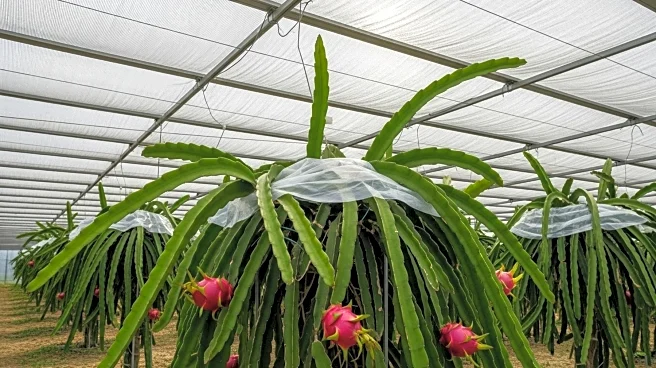What's Happening?
The ICAR–National Institute of Abiotic Stress Management (NIASM) in Baramati has developed an artificial shading technology to address sunburn issues in dragon fruit crops. This innovation comes in response to the challenges faced by dragon fruit, a high-value horticultural crop, in semi-arid and hot-humid regions of India, where temperatures often exceed 35°C. Traditional methods like using green shade nets or kaolin sprays have proven inadequate in creating a conducive microclimate for the plants. The new technology involves the use of black and white shade nets with 50 percent intensity, supported by RCC poles or metal angles, to reduce canopy temperature and light intensity. This system has shown significant benefits, including a 90 percent reduction in sunburn occurrence and a 30-40 percent decline in disease incidence, leading to improved flowering and fruit set.
Why It's Important?
The introduction of this shading technology is significant for the agricultural sector, particularly for farmers growing dragon fruit in regions prone to high temperatures. By effectively reducing sunburn and disease incidence, the technology enhances crop yield and quality, offering economic benefits to farmers. The improved yield, which can reach up to 8.0 tonnes per hectare, translates into increased income, with potential gains of ₹2-3 lakh per hectare. This development not only supports the sustainability of dragon fruit cultivation but also contributes to the broader goal of enhancing food security and agricultural productivity in India.
What's Next?
The successful demonstration of this technology in major dragon fruit growing districts like Pune, Satara, Sangli, and Solapur suggests a potential for wider adoption across other regions facing similar climatic challenges. As farmers continue to observe the benefits, including reduced pesticide use and accelerated flowering, the technology could become a standard practice in dragon fruit cultivation. Further research and adaptation may also extend its application to other crops susceptible to sunburn, thereby broadening its impact on the agricultural sector.
Beyond the Headlines
The development of this shading technology highlights the importance of innovative agricultural practices in adapting to climate change and extreme weather conditions. By mitigating the effects of heat stress, such technologies can play a crucial role in ensuring the resilience of crops and the livelihoods of farmers. Additionally, the reduction in pesticide use aligns with environmental sustainability goals, promoting healthier ecosystems and reducing chemical exposure.










